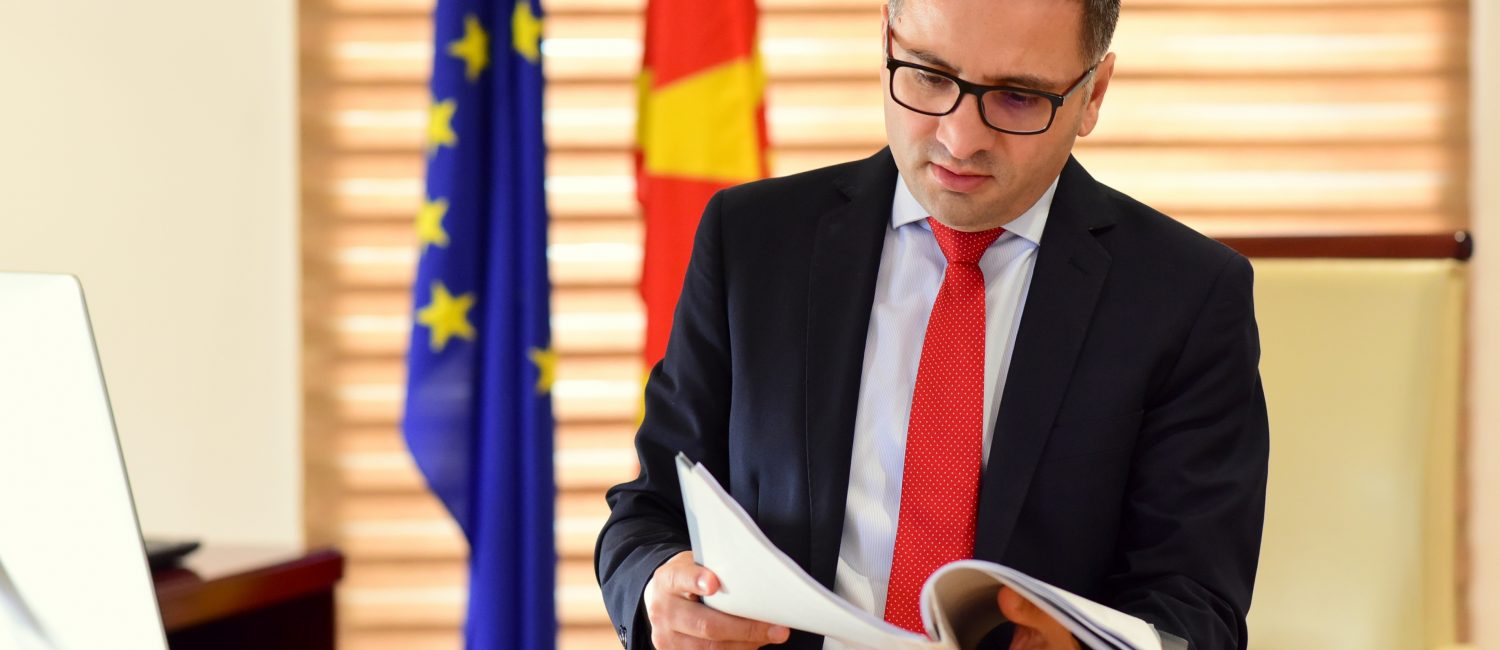26th February 2022, Skopje – The only certainty is uncertainty. This saying, which dates back to the time of the Roman Empire, best describes the situation the world is facing nowadays. Global economy started to recover from the pandemic, the global supply chain disruptions and the price pressures, however, it is now confronting a new challenge – Russia-Ukraine war.

At this point, it is impossible to predict the outcome of this crisis as regards the global economy. War is, by definition, a defeat for humanity, particularly in the XXI century, when the failure of diplomatic efforts and the unlearned lessons of history are paid with human sacrifices and personal tragedies. The outcome will depend on the invasion duration and its aftermath, the type of sanctions to be imposed by the Western countries, as well as from the Russia’s reciprocal reactions thereto, such as withholding of the key gas supplies to Europe, cyber-attacks, and so on. Still, the world and in particular Europe genuinely hopes for rapid cessation of hostilities and bloodshed.
As was the case with the pandemic, smaller disruptions in one region may generate larger disruptions globally. Shortage or rising prices of some of the goods exported by these countries could have a snowball effect, especially since the economy is still fragile from the pandemic blow. In fact, global supply chains are still tightened, the supply exerts price pressures, while the Federal Reserves of the USA and the European Central Bank previously announced tightening of the monetary policy due to the high inflation. In addition, political insecurity and instability weigh on the economic activity.
The purpose of this article is to give an initial analysis of the macroeconomic implications worldwide, in the European economies, as well as in our country. In this period of uncertainty, potential scenarios surely come down to speculative theories as presented by world think tanks.
Stock markets plunged in the red, peaks in oil and gold prices, rapid cryptocurrency recovery
On Thursday, we witnessed the investors’ reactions on the global markets. Brent crude oil price has, for the firs time after 2014, exceeded US$ 100 per barrel. Gas exceeded US$ 1,400 per 1,000 cubic meters. Wheat price picked up by 5.6% on the Chicago Stock Exchange, while stock markets, cryptocurrencies, stocks of companies having established business ties with both countries, recorded sharp decline. The Russian ruble depreciated to such an extent that the trading on the Moscow and St. Petersburg stock exchanges were immediately suspended. Stock market indices around the world fell by approximately 3% – Germany’s DAX down 2.8%, South Korea’s KOSPI down 2.6%, U.K.’s FTSE-100 down 2.3%, Japan’s Nikkei 225 down 1.8%, with Shanghai Stock Exchange (SEE) dropping 1.7%, etc. Most severe losses have been recorded at the stocks’ value of the companies from Russia and Ukraine, and those closely related thereto, the price drop of which ranged between 10% and 36%. London-listed stocks in Russia’s two biggest companies by market value, “Sberbank” and “Gazprom” fell as much as 77% and 42% in early trading before recouping some losses. Cryptocurrency market literally crashed, the value of which dropped by around 8%. Bitcoin plummeted almost 8%, while ethereum recorded even more drastic drop.
Prices of gold, palladium and aluminum, meanwhile, have picked up, as investors rushed to safe-haven assets in times of crisis.
Following “Black Thursday”, the price adjustment of some of the goods started on Friday. Thus, the price of gas decreased to US$ 1,230, while capital markets and cryptocurrencies recovered. European stocks grew, following the nine-month lows on Thursday, as investors sought to take advantage of the lower stock prices after this week’s sell-off, as fears of the impact from the Russia-Ukraine conflict on companies’ operations rattled investors. Cryptocurrency market also recovered on Friday, with Bitcoin rising by more than 10%, reaching US$ 38,500, restoring, overnight, all loses from the previous day. Ethereum also picked up by 10.5% to around US$ 2,600 upon plummeting approximately 15% the previous day.
What is the reason for such reaction by the investors on global markets and what are the risks ahead according to them? And why does Russian economy, which is twice smaller than the Italian one (with half the Russian population), have such strong effects?
“Gas station” and the “Granary of Europe” in the global supply chains
Russia is an energy superpower, or as some American economists call it, the “big gas station.” With a production of 9.7 million barrels of oil per day last year, it is just behind the United States, or as much as Canada and Iraq combined. Furthermore, Europe gets nearly 40% of its natural gas and 25% of its oil from Russia. Russia and Ukraine combined account for one third of the world’s wheat exports, one fifth of exported corn and 80% of exports of sunflower oil. Some countries are literally dependent on the imports from these economies. For instance, Turkey, which is already facing an economic crisis, is struggling with inflation that reaches close to 50%. Russia and Ukraine account for nearly 70% of Turkey’s grain imports, around 45% of Turkey’s total gas imports are from Russia, while crude oil imports from Russia range from 10% to one third of Turkey’s total imports. Having all this in mind, in addition to the geostrategic context, the economic one is also considered, in terms of involvement of several countries in the Russia-Ukraine conflict.
There is a major gap between Europe and the US in terms of exposure of their economies to the Ukraine crisis. The effects of economic sanctions will be much higher for the European economy than for the American economy. The most-exposed countries are Bulgaria, Estonia, Finland, Greece, Latvia, Lithuania, Malta, Poland and Slovakia. In almost all cases, dependence on Russia for (most energy) imports is much greater than dependence on Russia as an export market. I will further highlight the main economic consequences on the European economy, which could arise from the Russia-Ukraine war.
Decline in trade and foreign direct investments. Following the 2014 sanctions exchange, the greatest relative negative impact within the EU was felt by the CEE countries, as well as the Nordics and Germany. However, upon the exchange of these sanctions, there has been clear trade diversion and reorientation of investment flows between Russia and the EU. Almost every EU Member State reduced the foreign trade with Russia as a share of the total foreign trade. On the other hand, share of Russian foreign direct investments has significantly declined. Accordingly, exposure of foreign trade with Russia and FDIs therefrom would be even lower this time, having still adverse effects on certain economic activities.
Increase in natural gas prices. Russian exports to the EU are heavily concentrated in mineral fuels, which is correspondingly the main type of exposure of the European economies towards Russia. As of 2020, the exposure was highly uneven across the countries, whereby the ratio of imports of mineral fuels from Russia to GDP was as high as 15% in some European countries. As regards mineral imports in the aggregate, the Baltic States, the rest of Eastern Europe, and the Balkans are the most exposed regions. However, the exposure varies according to the type of commodity, with natural and liquid gas being the most important one. According to data of “Gazprom”, in 2020, Germany and Austria accounted for 60% of total Gazprom sales destinations in Europe. As of the end of 2020, “Gazprom” controlled 12% of global gas production and 17% of global gas reserves, exerting considerable power on the global gas market. Accordingly, any restriction on “Gazprom” sales in Europe is going to cause an immediate upward shift in the global gas price.
European energy prices significantly soared after Russian forces invaded Ukraine. Thus, prices of energy futures in Germany and the Netherlands increased from 30%-40%. Coal prices also recorded significant increase of over 10%. New sanctions against Russia have been announced by the United States and the European Union, including restricting Russia’s access to foreign currencies, which is expected to result in restricting the access to raw materials such as oil, gas, base metals and food on the global markets.
Increase in inflation rates. Even the potential for sanctions causes a rise in energy and food prices, contributing to already high inflation, especially in CEE. Households in CEE spend a larger share of their income on energy and food, so many are already in a very difficult situation, leading to the imposition of price controls in some countries. Further evolution of the developments and stronger sanctions would make this situation much worse.
The intensity of market disruption will also depend on what sanctions the US and the EU are to impose and whether they will cover oil and gas sectors. For instance, if Russia is disconnected from the international Swift system, payments as regards the supply with Russian gas and oil, would be impaired. Such a measure would trigger for suppliers to apply force majeure (vis major) clauses, thus interrupting the supply with dramatic consequences on European consumers in terms of access to fuels and the prices thereof. This will increase the pressure on the inventories and the commodity reserves available to Europe, not being with full capacity before the escalation of the military actions, which could not be restored throughout the summer.
Around one-third of Russia’s gas exports to Europe usually go through Ukraine, and the conflict escalation is expected to disrupt these flows. Due to such increased risks, the analysts expected for the higher prices of fuels to be kept by the end of the year, rather than being stabilized in the second half of the year, as expected. In such a constellation, Europe will have to compete with Asia for access to liquefied natural gas.
Reduced liquidity and higher borrowing costs. EU financial institutions could be exposed to financial sanctions, which could further have significant adverse effects on the liquidity and the borrowing costs. At the moment, foreign-owned financial institutions control EUR 60 bn assets in the Russian banking market with an overall share of 4% of the total. Raiffeisen, Société Generale, UniCredit are the key institutions, which could be affected by sector-wide sanctions should they be imposed on the whole banking sector. Yet even if not imposed directly, they could become affected by negative network effects in case foreign-owned banks possess assets or liabilities towards the sanctioned legal entities, leading to a sudden drop in liquid assets or higher capital charges. In case investors shift to risk-free assets and gold, there will be a weakening of currencies and higher borrowing costs in CESEE. Thereby, the Czech Republic would be least affected, while Hungary and Romani could suffer big declines in the value of their currencies and an increase in the borrowing rates.
Sanctions related to Russia could also affect the European economy, in particular Germany
What sanctions can the EU and the USA punish Russia with? One of the potential sanctions is to restrict or stop energy imports from Russia. This would include not putting the Nord Stream 2 gas pipeline into operation, which would severely damage Russia, and to the same extent EU as well, particularly Germany. This scenario is highly unlikely, as it would have significant consequences on the European, and thus the global economy.
Second scenario is cutting Russian banks off from foreign currencies. This would cause significant financial disruption in Russia, a reduction of lending and investment, and require large-scale state injections of capital into the banking sector.
Third scenario is to ban exports of high-tech parts to Russian industry. This scenario is not impossible given that there are still important industrial inputs that Russia cannot buy from others such as China. Such ban would affect certain industries in Russia but not the economy as a whole.
It must be also taken into account that the imposition of sanctions by the EU and the USA is very likely to be accompanied by sanctions imposed by Russia as well.
Challenges the European economies are to face will be reflected in our economy
Direct exposure of our country to Russian and Ukraine economies is relatively low. Imports to and exports from each of these countries ranges around 1%. In addition, their share in the FDIs in our country, as well as the inflow of remittances account for below 1%.
Russia’s participation in the total exports in our country in the period 2011 – 2021 decreased slightly, thus reducing from 0.9% in 2011 to 0.7% in 2021 (with the exports amounting to EUR 47.6 million). Russia’s participation in the total imports over the past ten years decreased significantly, from 6.3% in 2011 to 1.6% in 2021 (with the imports amounting to EUR 147.2 million). Most exported products to Russia are pharmaceuticals, fruit and vegetables, with natural gas being imported therefrom. At the same time, Russia is the largest exporter of natural gas in our country, accounting for 96.5% in the total import of natural gas. In the event of a greater escalation of the military conflict in Ukraine, it will be necessary to look for alternative markets for the exports of these products, as well as for the supply of natural gas, and a shortage thereof could be expected, which would lead to a rise in its price. Flat-rolled products of iron or non-alloy steel are mostly imported from Russia, being their third largest exporter in our country, followed by Romania and Ukraine. In case of further escalation of the military conflict, some impact can be expected on the metal processing and construction industries using these products, and alternative markets such as Serbia, Turkey and China will need to be sought.
Exports to Ukraine in the last 10 years decreased from 2.1% in 2011 to 0.2% in 2021 (with the exports amounting to EUR 14.4 million). Ukraine’s participation in our total imports in the last 10 years decreased, from 2.2% in 2011 to 1.3% in 2021 (with the imports amounting to EUR 124.3 million). Our country mostly exports pharmaceuticals, electric vehicle batteries and agricultural products, while importing flat-rolled iron or non-alloy steel products, as mentioned above.
In addition to the direct impact on Macedonia economy, via the trade, the developments in Ukraine might have negative impact on both the European and the global economy, via additional disruptions of global supply chains, i.e. negative impact on foreign demand. As a small and open economy, being closely related to the European one, these disruptions will be undoubtedly felt in our country as well. At the same time, this might cause increased caution among foreign and domestic investors, which would affect the level of investments being made.
We are attentively monitoring the developments, thus creating scenarios to accord with the potential outcome therefrom. Commodity reserves are at satisfactory level, the Budget is liquid and we have the necessary funds to take actions should a need arise therefor. Instruments have also been put into place in case of a need to adapt to major market disruptions.
Adequate measures have already been undertaken, geared towards protecting the living standard of the citizens, by setting margin cap on part of the commodities. Moreover, VAT on electricity was reduced, thus lowering the electricity-related costs for the citizens. Furthermore, we stand ready to adopt measures and policies in the interest of the citizens, primarily to the end of protecting the most vulnerable groups, as well as supporting the economy.
Amid crises like this, making a thorough analysis is of particular importance, by taking into account all parameters, even those that seem minor and trivial at the moment, all to the end of setting as more accurate expectations as possible. Neither pessimism nor optimism should be spread, we should be rather realistic and take actions by keeping pace with the ongoing developments. By having such strategy in place, we also acted during the pandemic, when 6 sets of anti-crisis measures were adopted, being intended for the citizens and the business sectors, with all reports of the international institutions acknowledging our country’s effective and prompt response thereto.
Fatmir Besimi, Minister of Finance
















